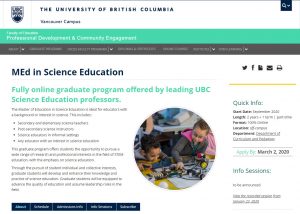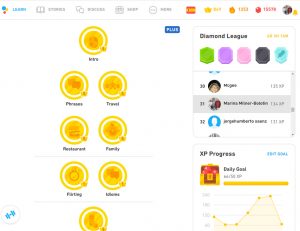When I started teaching at UBC more than 10 years ago, I was asked to teach an online course to graduate students in our Masters in Education course. The course was focused on mathematics and science teaching. It was a challenge as I had never taught online before. I was also unfamiliar with the platform I was supposed to be using (I think it was Blackboard then or maybe something different?). Moreover, I had never been a student in an online course myself, to appreciate what it means to learn online. However, I like challenges and I like to learn new things. I also love to learn and I love to explore new ways to learn, so that was an opportunity for me.
While most people today think that online teaching is all about learning how different technologies work, I firmly believe that it is all about engaging students in a different learning environment – online rather than face-to-face. Since 2010, I have been teaching online and face-to-face. Some courses I even taught in both modes, so I could compare my experiences. For the last 10 years and I was lucky to learn from colleagues, who have been very experienced online educators, such as Prof. David Anderson in my department. We designed courses together, provided feedback to each other and revised the courses accordingly. More than a decade ago, David started an online Master’s Program in Museum Education Program and together two years ago we started an online M.Ed. in Science Education Program. Our online program has become so popular that this year the number of applicants more than doubled.
During my online teaching I also made lots of mistakes and learned a lot of things from my colleagues and students. I am very lucky that our students are teachers (most of them are mathematics and science educators) and they are always ready to help and suggest ideas of how we can improve our learning. I also was actively involved in learning foreign languages online using Duolingo:
It looks like many educators today will be hard pressed to consider online teaching. Many of them have never taught online or even have never learned online. Some haven’t even feel comfortable with using a course management system or creating their own material to post online. Luckily, my academic life forced me to keep learning all these things.
While I cannot generalize my experience to all fields, I think some of it might be relevant to others. So here I would like to share a few things I have learned in these years about successful online teaching. I write them in no particular order:
- Structure your course, so your students know what to expect and how to manage their time. We think of this structure in advance by designing the modules and assignments that are clearly spread out and are reasonable in terms of student time commitment.
- Create assignments that are meaningful to your students and can be submitted online. It can be an essay, a video of a lab or some other material, but it has to be submitted online. I find it very useful to create assignments that my students can submit a draft first, and then receive feedback and resubmit. You can even ask students to provide peer feedback.
- Create opportunities for collaboration and multiple avenues for collaboration. Working online provides many opportunities for collaboration. We use Collaborate Ultra in Canvas, one can use any other tool – the important part is model it with the students before asking them to use it.
- Use short videos to do a brief preview of the module and an overview of the module. I found it important to buy a good camera and a head set to make sure the quality of the videos is decent. These videos will help your students build connection with you and get to know how you are thinking.
- Use resources created by others and contribute your resources to the community. For example, I use YouTube videos other people shared. I also use online simulations, like PhET and many other amazing online resources. Many of them have an element of a game, as well as team learning opportunities. I am always learning about new amazing tools we can use. Very often, people design excellent resources and are open to sharing them. Use these resources and share yours. For example, I share the resources we created for STEM education: https://blogs.ubc.ca/mmilner/outreach/math-science-education-for-all/
- Use the power of course management systems for providing feedback. I create rubrics for my students’ assignments and then grade all of it online in Canvas. I find it very useful.
- Take advantage of the flexibility of online education! Should it be synchronous or not? Should you arrange who collaborates with whom or should the students choose it? How do you stagger the submission deadlines? How should you use the Discussion Board? All these questions can be answered in many different ways, but you have to use what works for you and your students. Ask your students to provide feedback on different course components.
- Don’t overwhelm your students: Remember that uploading a lot of material online doesn’t mean that the students will have the time to read it and review it. So very often less is more.
- Use Discussion Board wisely. Remember that you have to balance student participation and make sure they contribute to the DB for a reason and not only to get participation marks.
- Become an online learner to become a great online teacher. Learn online and see how it feels to you to learn something in an online community. Then use this experience to inspire your students!
GOOD LUCK!


